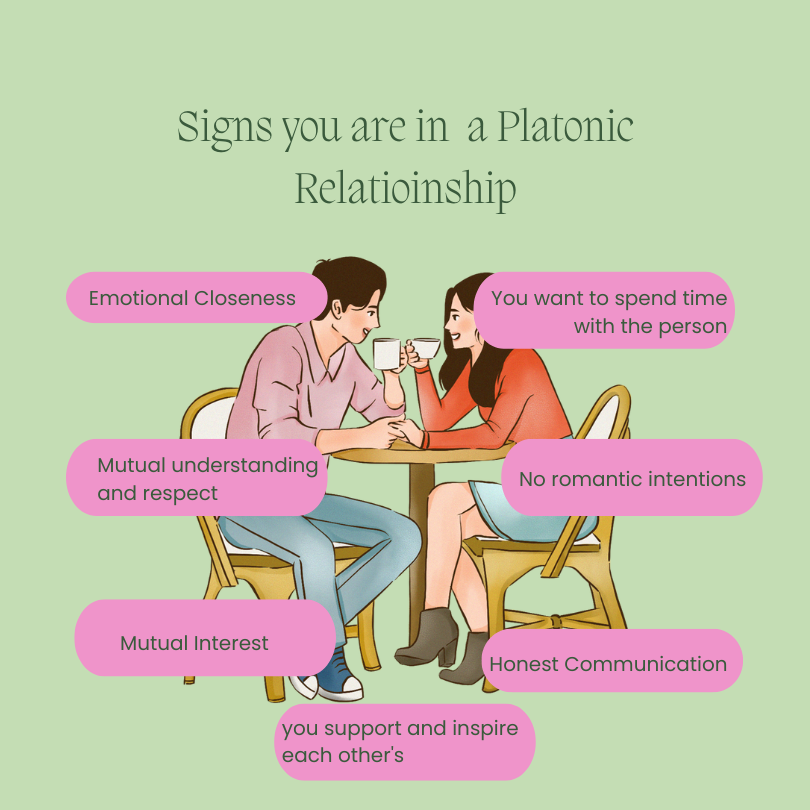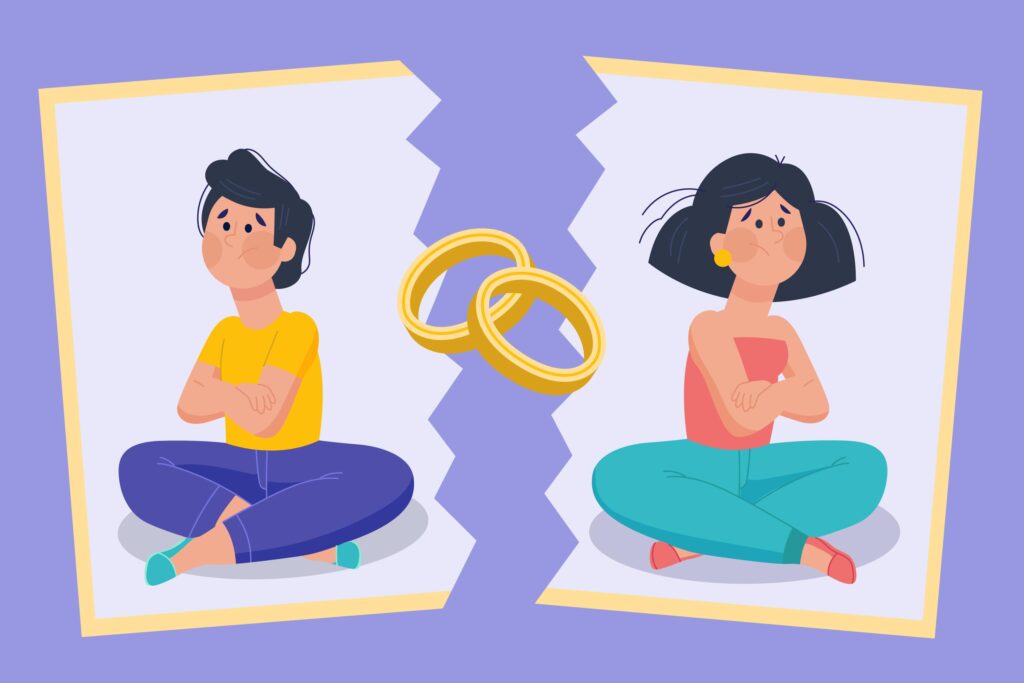
Relationships are generally characterized by romance or sexual involvement. But have you ever wondered about a relationship that is devoid of romance and sex? Today in this article we will cover one such type of relationship, what it is, how to be in such type of relationship, how it helps you and some frequently questions asked related to that.
So, have you ever been in a platonic relationship? But wait…! Do you even know what it is?
What is a Platonic Relationship?
A platonic relationship is a close friendship between two people without sexual or romantic involvement. It is based on mutual affection and respect without the romantic intentions commonly found in intimate partnerships.
In simple words, a relationship is platonic if there is no physical intimacy or sexual activity between you and the other person, even if the desire is there.
It can often be described as a solid and meaningful connection between friends, or co-workers. Although there is no romantic or sexual urge, there is a feeling of emotional intimacy, mutual understanding, and friendship.
Now, Let’s see the types.
Types of a Platonic Relationship
Several terms are used to denote platonic love. These include:
1. Bromance: The phrase refers to an intimate, loving, non-sexual relationship between two men.
2. Womance: The term refers to an emotional, non-sexual, non-romantic relationship between two women.
3. Work Spouse: Work spouse is sometimes used to indicate a tight, non-sexual type of love between co-workers.
Now, you know about platonic friendships and their types, but how do you know it is a platonic love or a romantic love? Let, me tell you some points that help you differentiate between the two.
Signs you are in a Platonic Friendship
Platonic love is when there is trust, safety, and validation in a close relationship. It evokes a sense of “feeling good” and being cared for without romantic or sexual intentions.
Some of the signs of platonic love are:

1. Closeness: You feel a close connection with the other person and share things in common.
2. Honesty: You can be honest and open with the other person about what you think and feel.
3. Acceptance: You feel comfortable and safe to be yourself around the other person. You don’t judge each other.
4. Understanding: You respect and support each other’s personal space and boundaries. You don’t try to change or control each other.
5. Loyalty: You are faithful and reliable to each other. You don’t betray or hurt each other intentionally.
6. Communication: You communicate well with each other. You listen and express your thoughts and feelings clearly.
7. Fun: You enjoy spending time with each other. You have fun and laugh together.
Difference between a Platonic and Romantic Relationship
As of now, you know a platonic connection and a romantic connection are two different types of connections. The one common thing between both types of relationships is that they often involve close friendship and sometimes even love.
The individuals in a romantic friendship are usually physically involved while there is no sex or physical closeness in a platonic friendship.
Here are the main points of difference between both types of relationships:
| Platonic Relationship | Romantic Relationship |
|---|---|
| It is completely based on friendship and companionship. | This includes emotional and physical attraction. |
| No romantic or sexual attraction. | Acts of physical intimacy are common. |
| It focuses on mutual respect and understanding between partners. | There can be physical affection like hugging and shaking hands. |
| Individuals care deeply for each other as friends. | Partners take care of each other in a romantic way. |
| Passionate love and desire are central ideas here. | It focuses on mutual respect and understanding between partners. |
| There is often a lack of specificity and long-term commitment. | This can include long-term plans and a shared future. |
| Emotional bond is the cornerstone here. | Passionate love and desire are central idea here. |
Also Read: Karmic Relationships: Definition, Signs, Its Effects and How to End?
Benefits of a Platonic Love
There are many benefits from emotional support to personal growth. Following are some of the important benefits of this type of friendship:
1. Emotional support
Platonic relationships can provide you with emotional support when you need it. They can help you cope with stress, anxiety, depression, loneliness, grief, or any other challenge you may face.
2. Social connection
Platonic relationships can help you feel connected and belonging to others. They can reduce your sense of isolation and increase your sense of community.
3. Personal growth
Platonic relationships can help you grow as a person. They can challenge you, inspire you, motivate you, teach you, or encourage you to pursue your goals and dreams.
4. Happiness
Platonic relationships can make you happy. They can bring joy, laughter, fun, excitement, gratitude, or satisfaction to your life.
Also Read: How to Overcome Depression with and without Medication?
Now, you may be interested in this type of love and want to have one but you don’t know where to start. Let’s discuss some tips to start one.
How to form a platonic relationship?
Platonic connections can be important for psychological health. Research has shown that social support is important for maintaining mental health, so building a network of family, friends, and other loved ones can be beneficial to your overall health.
Here are the things you can do to be in platonic love:
- Join social networking groups so you can expand your social circle.
- You can enroll yourself in workshops or classes on topics of your interest.
- You can participate in online sessions.
- You can also participate in community service for issues you care about.
How to maintain a platonic relationship?
Now, after you have formed a Platonic relationship, the question here is how to maintain it.
Platonic relationships require effort and care to cultivate and maintain. Here are some tips to help you build healthy and lasting platonic relationships:
1. Be yourself: Don’t pretend to be someone else or hide your true self. Be authentic and genuine with the other person.
2. Be respectful: Respect the other person’s feelings, opinions, preferences, choices, and boundaries. Don’t impose your thinking or expectations on them.
3. Be supportive: Support the other person’s goals, dreams, passions, and interests. Celebrate their achievements and support them in their failures.
4. Be attentive: Pay attention to the other person’s needs, wants, and emotions. Show interest and curiosity in their life and experiences.
5. Be communicative: Communicate regularly and effectively with the other person. Share your thoughts and feelings and also listen to theirs. Give feedback and ask for feedback.
6. Be loyal to each other: Be faithful and reliable to the other person. Don’t lie, cheat, or betray them. Keep your promises and commitments.
7. Be flexible: Be willing to compromise and adapt to the other person’s changing circumstances. Don’t be rigid or stubborn.
8. Be appreciative: Appreciate the other person’s presence and contribution to your life. Express your gratitude and recognition for them.
9. Have fun together: Have fun and enjoy the time you spend with the other person. Do things that you both like and try new things together.
The Bottom Line
The beauty of platonic relationships shines through in a world where love affairs are often encountered. These relationships go beyond societal norms and provide a special path for emotional closeness, camaraderie, and personal growth.
When we examine the depth and importance, it becomes clear that their benefits for our common well-being far exceed those of romantic partnerships. So let’s cherish the important things that platonic relationships bring into our lives and recognize their beauty.
Some Frequently Asked Questions
1. What is a platonic relationship?
A platonic relationship is a close, intimate relationship between individuals characterized by emotional intimacy, mutual respect, and companionship, without any romantic or sexual involvement.
2. Is it possible for platonic friends to develop romantic feelings over time?
It is possible to desire physical intimacy (such as hugging, kissing, or touching) or sex with the other person but not be engaged in these activities. If no physical intimacy or sex exists between you and the other person, it is a platonic relationship—even if the desire is there.
3. Can a romantic relationship turn into a platonic relationship?
In some cases, a romantic relationship can turn into a platonic relationship if the romantic attraction fades but the strong bond of friendship remains. This change requires mutual consent and open communication.
4. Can platonic relationships last a lifetime?
Yes, platonic relationships can last a lifetime. Many people maintain close friendships for decades, providing lasting emotional support and companionship through various stages of life.
5. Do platonic relationships require as much effort as romantic relationships?
Yes, like any relationship, platonic relationships also require effort and nurturing. Regular communication, spending quality time together, and being there for each other contribute to the development and maintenance of a bond.


